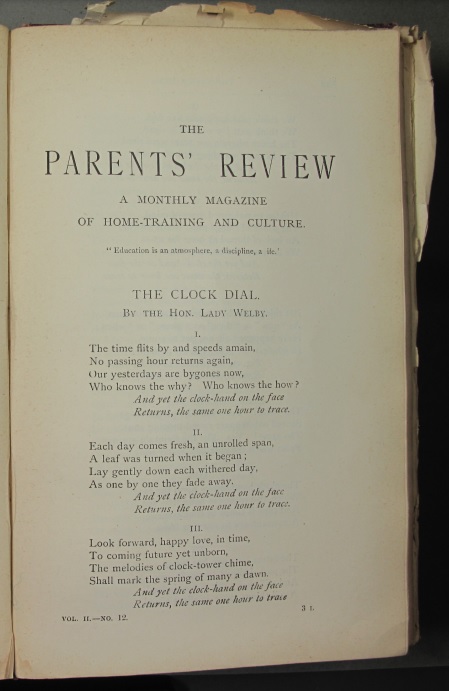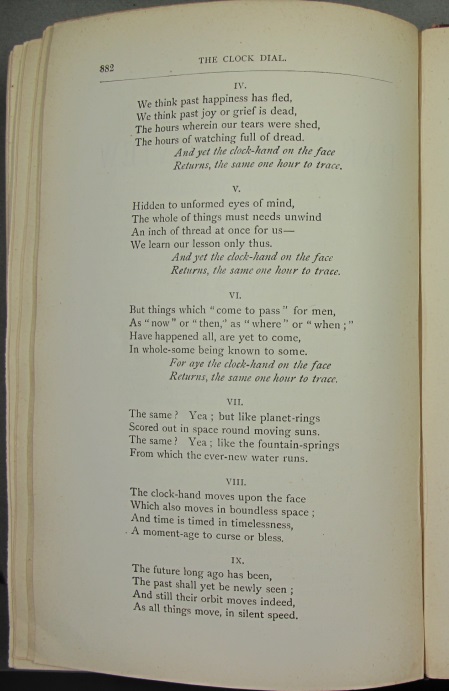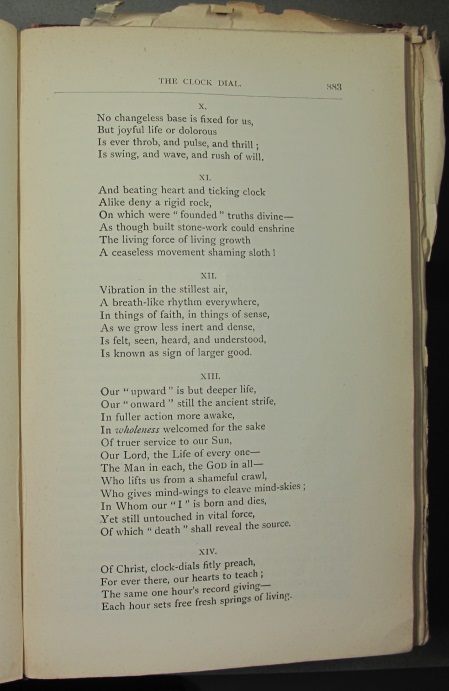THE CLOCK DIAL.
By the Hon. Lady Welby.
I.
The time flits by and speeds amain,
No passing hour returns again,
Our yesterdays are bygones now,
Who knows the why? Who knows the how?
And yet the clock-hand on the face
Returns, the same one hour to trace.
II.
Each day comes fresh, an unrolled span,
A leaf was turned when it began;
Lay gently down each withered day,
As one by one they fade away.
And yet the clock-hand on the face
Returns, the same one hour to trace.
III.
Look forward, happy love, in time,
To coming future yet unborn,
The melodies of clock-tower chime,
Shall mark the spring of many a dawn.
And yet the clock-hand on the face
Returns, the same one hour to trace
IV.
We think past happiness has fled,
We think past joy or grief is dead,
The hours wherein our tears were shed,
The hours of watching full of dread.
And yet the clock-hand on the face
Returns, the same one hour to trace.
V.
Hidden to unformed eyes of mind,
The whole of things must needs unwind
An inch of thread at once for us—
We learn our lesson only thus.
And yet the clock-hand on the face
Returns, the same one hour to trace.
VI.
But thing which “come to pass” for men,
As “now” or “then,” as “where” or “when;”
Have happened all, are yet to come,
In whole-some being known to some.
For aye the clock-hand on the face
Returns, the same one hour to trace.
VII.
The same? Yea; but like planet-rings
Scored out in space round moving suns.
The same? Yea; like the fountain-springs
From which the ever-new water runs.
VIII.
The clock-hand moves upon the face
Which also moves in boundless space;
And time is timed in timelessness,
A moment-age to curse or bless.
IX.
The future lang ago has been,
The past shall yet be newly seen;
And still their orbit moves indeed,
As all things move, in silent speed.
X.
No changeless base is fixed for us,
But joyful life or dolorous
Is ever throb, and pulse, and thrill;
Is swing, and wave, and rush of will.
XI.
And beating heart and ticking clock
Alike deny a rigid rock,
On which were “founded” truths divine—
As though built stone-work could enshrine
The living force of living growth
A ceaseless movement shaming sloth!
XII.
Vibration in the stillest air,
A breath-like rhythm everywhere,
In things of faith, in things of sense,
As we grow less inert and dense,
Is felt, seen, heard, and understood,
Is known as sign of larger good.
XIII.
Our “upward” is but deeper life,
Our “onward” still the ancient strife,
In fuller action more awake,
In wholeness welcomed for the sake
Of truer service to our Sun,
Our Lord, the Life of every one—
The Man in each, the Gᴏᴅ in all—
Who lifts us from a shameful crawl,
Who gives mind-wings to cleave mind-skies;
In Whom our “I” is born and dies,
Yet still untouched in vital force,
Of which “death” shall reveal the source.
XIV.
Of Christ, clock-dials fitly preach,
For ever there, our hearts to teach;
The same one hour’s record giving—
Each hour sets free fresh springs of living.
Petrilli 2009 lists a poem by this title as printed in two pages by Clarke, Grantham, in 1887. The above was copied from The Parents’ Review, Vol. II, No.12. [1892] pp. 881-883.


